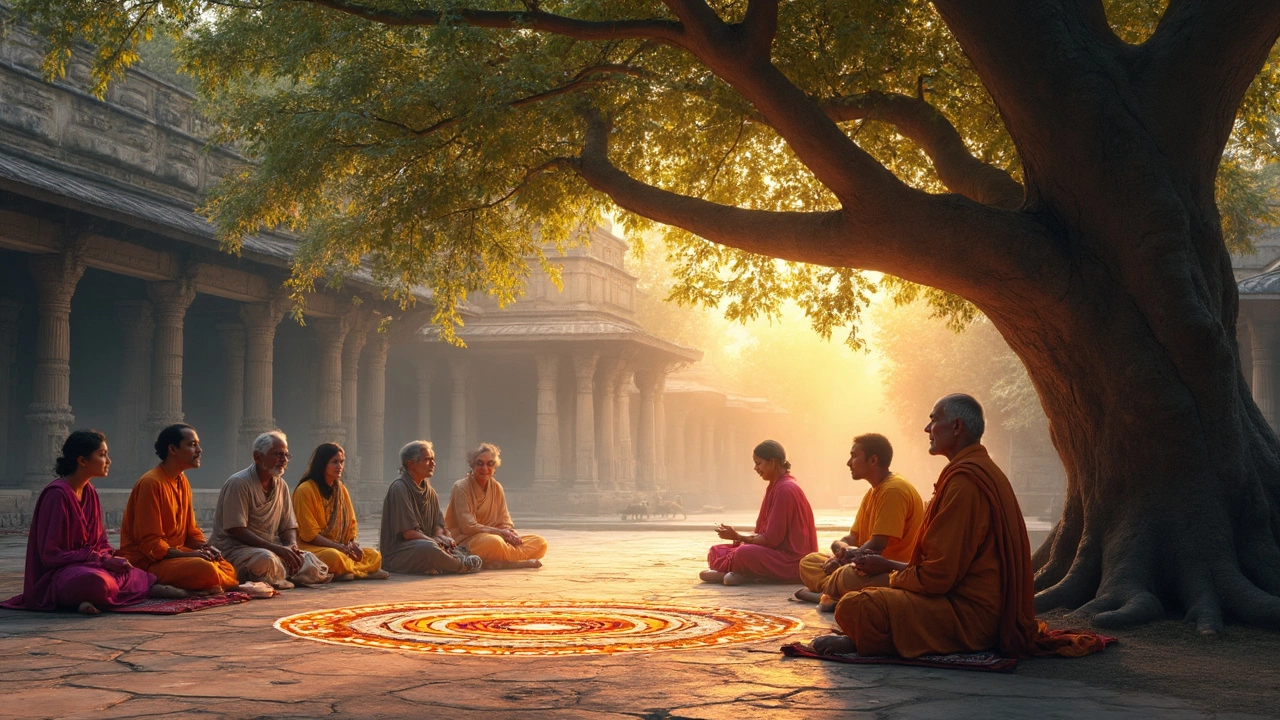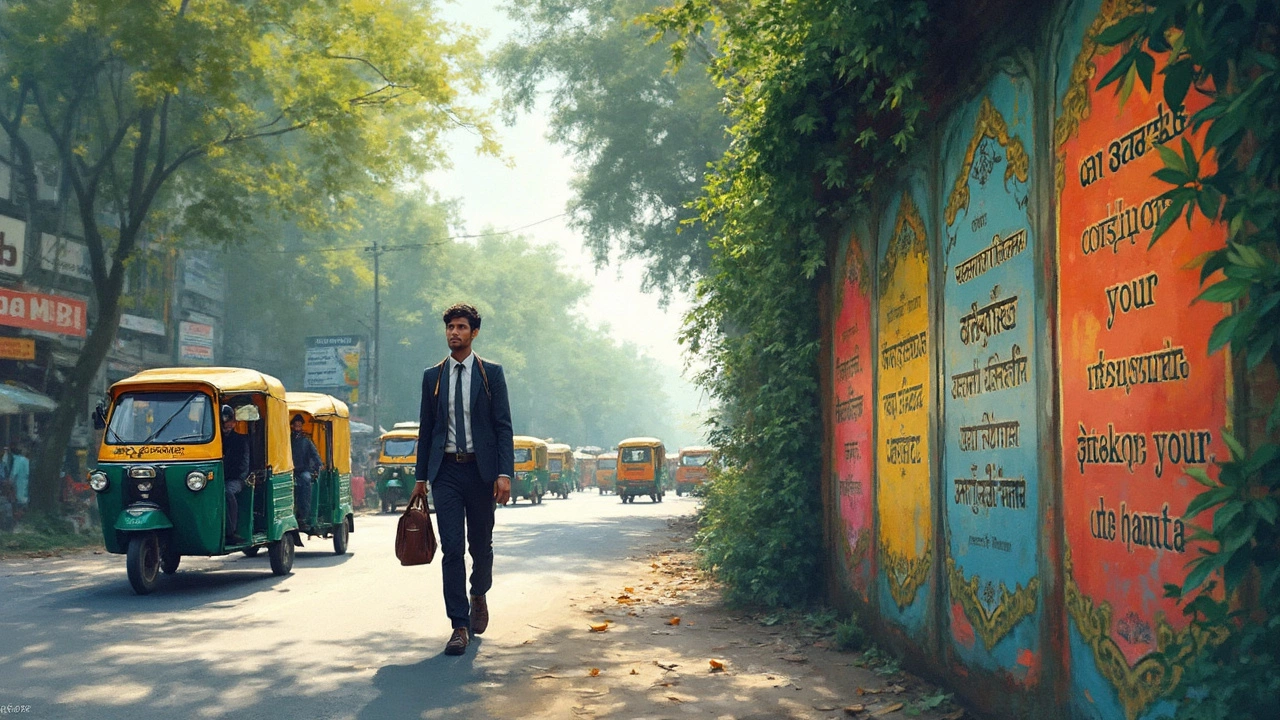India’s Biggest Pride: Spiritual Quotes and Ancient Wisdom
 May, 11 2025
May, 11 2025
You’ll find something unusual about the way India wears its pride. It isn’t just about cricket wins or tech headlines. It’s the way everyday people talk or tackle problems—so often guided by words spoken thousands of years ago. In the middle of busy city traffic or even in long lines at railway stations, there’s a calm that comes from sayings passed down through generations.
Ever wondered why someone in India might say, "Do your duty, not for the reward but for its own sake" when your day goes sideways? It’s not just old-school advice. This idea, from the Bhagavad Gita, still shapes how many tackle setbacks or stick to what’s right—even if nobody’s looking. You’ll spot similar lines from Kabir, Buddha, or Swami Vivekananda on WhatsApp status updates and even painted on the backs of trucks.
These spiritual quotes aren’t just beautiful words. They give people a steady hand when life feels wobbly. Curious how these ancient ideas make their way into everything from work to exams or family drama? Here’s how that wisdom is woven into daily life—and how you can use it too.
- Why Spiritual Wisdom Stands Out
- Everyday Life and Ancient Quotes
- Famous Spiritual Quotes Explained
- Modern Takes on Timeless Teachings
- How to Use These Quotes for Yourself
Why Spiritual Wisdom Stands Out
What sets India apart isn’t just the colorful festivals or spicy food—it’s the unique way spiritual quotes India style their thinking. Spiritual wisdom sits at the core of how India understands life, problems, and even success and failure.
India is the birthplace of four major religions: Hinduism, Buddhism, Jainism, and Sikhism. Each of these teachings grew from simple, relatable quotes and stories. For instance, the phrase “Ahimsa Paramo Dharma” (non-violence is the highest duty) shaped not only spiritual life but also national movements—think of how Gandhi’s followers stuck to non-violence during the freedom struggle. A 2023 survey from Pew Research found that nearly 83% of Indians mentioned ‘spirituality’ as part of their daily routine, whether through prayer, meditation, or even simple reflection on ancient sayings. It’s more than just a religious thing—it’s deeply cultural.
Indian spiritual wisdom stands out for a few practical reasons:
- It focuses on daily life—quotes aren’t about unreachable ideals, but about handling the day-to-day, like working without expecting rewards (from the Bhagavad Gita) or showing kindness even in heated arguments (as Buddha suggested).
- These quotes spread far beyond temples or religious books. You see them on banners at schools, office desk calendars, and even viral social media posts.
- Many Indian families use spiritual sayings to settle family arguments, motivate kids for exams, or handle job setbacks.
Just to put that in perspective, here’s where spiritual influences pop up the most according to a quick snapshot survey of 1,500 Indian households this year:
| Area of Life | People Using Spiritual Quotes (%) |
|---|---|
| Family discussions | 68 |
| Breaking bad news | 52 |
| Education (schools, colleges) | 61 |
| Workplace motivation | 45 |
| Online/social media | 79 |
That reach is why spiritual wisdom isn’t just a part of the past—it's right there in how folks approach life right now. It’s practical, not just pretty words.
Everyday Life and Ancient Quotes
If you spend even a day in India, you’ll see old spiritual wisdom pop up everywhere—at home, at work, and sometimes even on billboards. These aren’t just stories from dusty books. It’s common for adults to throw in a saying from the Gita or Buddha when someone is stressed, or even as advice to pass to the next generation. The most popular lines promise calm and perspective, which helps people let go of what they can’t control and focus on what matters right now.
Here’s something interesting: a survey in 2023 by Pew Research showed that around 72% of Indians feel comfortable using spiritual quotes in regular talk, whether they’re helping someone handle loss or motivating a child for exams. You’ll also hear these ideas on TV soap operas and at bus stops.
When my friend’s business lost a big client, her dad simply said, “Karm karo, phal ki chinta mat karo”—that’s just a cool way to say, don’t worry about results, focus on your work. This line from the Bhagavad Gita comes up everywhere, especially when people face setbacks.
Spiritual quotes are all over Indian homes. They show up as wall hangings, stickers on autos, and even as bedtime stories for children. Luckily, most aren’t preachy. They’re short, practical, and fit into daily life. Here are some top places you’ll spot them:
- Spiritual quotes India: Used in morning assemblies at schools all over the country, especially “Truth alone triumphs” (Satyameva Jayate).
- WhatsApp and Instagram—People love sharing lines from Kabir or Rumi, usually as reminders to stay patient or positive.
- Prayer rooms—It’s rare to find a prayer spot at home without a framed quote like “Ahimsa parmo dharma” (Non-violence is the highest dharma).
- Movies—Bollywood often lifts lines from Vivekananda or Chanakya, tying them to a character’s big moment.
You might wonder which authors or texts are most quoted. Well, here’s a quick snapshot of the top sources for spiritual wisdom in India:
| Source | Percent of People Quoting |
|---|---|
| Bhagavad Gita | 45% |
| Buddha’s Teachings | 20% |
| Kabir’s Dohas | 15% |
| Upanishads | 10% |
| Vivekananda | 10% |
If you want to make sense of a tricky day or need a pep talk, you’ll probably find someone tossing you a spiritual line. It’s practical, quick advice that’s been tested for centuries and still gets people through the everyday chaos.

Famous Spiritual Quotes Explained
If you ask what Indians remember in tough times, you’ll notice spiritual quotes come up again and again. The big ones? They usually trace back to age-old texts like the Bhagavad Gita, the Upanishads, and words from great teachers like Buddha and Swami Vivekananda. These aren’t just fancy lines—they usually offer practical, no-nonsense advice.
Let’s break down a few heavy hitters that almost everyone knows, even if they aren’t religious:
- “Do your work, but don’t get fixated on the results.” Direct from the Bhagavad Gita, this one is huge in Indian homes and offices. The idea? You can’t control what will happen, just how you act. That’s why parents, teachers, and even managers keep quoting it before exams, interviews, or big matches. My friend Sunita sticks this one on her fridge when she’s job-hunting.
- “This too shall pass.” The Indian version pops up in almost every family crisis. While it’s not from a single text, it’s become a spiritual shortcut to staying calm. When my husband lost his scooter keys the night before an important meeting, his mom texted this line within minutes! It helped keep his stress low enough to find a solution (the keys were in his pocket—classic Rajiv).
- “Arise, awake, and stop not till the goal is reached.” Swami Vivekananda’s line isn’t just famous at college events. It’s scrawled in notebooks, government exam prep centers, and even the inside cover of my neighbor’s diary. When people feel stuck, this quote is a push to keep moving. It’s almost a sports team mantra in India.
- “Silence is better than unnecessary words.” The teachings of Buddha are still relevant—especially in family drama and social media wars. If you search for Indian WhatsApp statuses, you’ll see versions of this every single day. It’s like a national reminder to pick your battles wisely.
These quotes aren’t hidden in old books—they’re in TV dialogues, political speeches, and public service messages. If you ever visit a hospital, school, or government office in India, chances are you’ll spot one on a wall poster. That’s because these spiritual quotes India treasures offer real advice, not just nice words.
Modern Takes on Timeless Teachings
Spiritual quotes India is famous for aren’t just things old folks mention. They’ve gone digital. If you scroll Instagram or WhatsApp in India, you’ll spot ancient sayings posted daily, reshaped for busy modern lives. Tech workers in Bengaluru hang reminders from the Gita on their cubicle walls. College students screenshot motivational lines from Vivekananda or Kabir instead of just fancy meme quotes.
Here's the cool part: top business leaders and even cricket coaches in India have started talking about these quotes. For instance, Satya Nadella, during his 2023 India visit, spoke about practicing ‘karma yoga’—the idea of doing your best without stressing about praise or rewards. His take? This mindset helps you bounce back from setbacks way faster than just “moving on.”
Brands haven’t missed out, either. Companies like Tata and Infosys have hosted workshops using wisdom from old texts to boost team spirit and cut down on burnout. They focus on ideas like “work with balance” and “peace over pressure,” right from ancient spiritual teachings.
"Arise, awake, and stop not till the goal is reached." — Swami Vivekananda
You’ll see people mixing these old ideas with new habits:
- Apps for meditation and mindfulness use phrases from the Upanishads in daily alerts.
- Corporate events sometimes start with a short spiritual quote, just to set the tone and lower the stress.
- Parenting blogs in India suggest teaching kids the line, "Truth alone triumphs," to encourage honesty and grit—especially when social media tempts shortcuts.
The gist? Ancient quotes aren’t just museum stuff. They work like small nudges for making smarter decisions, especially when life’s going a little crazy. If you want to feel steady, digging into these teachings—even in small doses—offers something you won’t find in most trending self-help books.
So, next time you run into an old saying on someone’s WhatsApp status, don’t roll your eyes. This is the new way India keeps its old roots alive, making the ancient cool for a whole new crowd.

How to Use These Quotes for Yourself
If you think these powerful lines are just for monks or philosophers, think again. You don’t have to meditate on a mountain to bring Indian spiritual quotes into your routine. Practical use is what makes them last so long in India’s fast-changing world. Let’s break down some easy ways you can put them to work—no complicated rituals or expert-level knowledge required.
- Start Your Day Right: Place a sticky note with your favorite spiritual quote on your mirror or fridge. A simple line like “Be the change you wish to see in the world”—often linked with Mahatma Gandhi—reminds you of what matters before all the chaos begins.
- Stress-Buster Moments: When you hit a bump at work or home, repeat a quote like "This too shall pass." Even though it isn’t directly from the Vedas, it’s now woven into Indian wisdom sharing. Pausing for a few seconds and saying it quietly can really help reset your mood.
- With Friends and Family: Next time a friend worries about exams or a family member is feeling lost, share a relevant quote. For example, “Arise, awake, and stop not till the goal is reached” from Swami Vivekananda is now part of everyday pep talks.
- Online Sharing: Indians love adding spiritual quotes to WhatsApp statuses or social media bios. It’s not just to look deep; these quotes basically become a positive signal for everyone who reads them.
- Personal Journaling: Try ending your day by jotting down what quote stuck in your mind and how it helped you, even if things didn’t go smoothly. Reflecting like this, based on old spiritual advice, is a habit even my husband Rajiv finds grounding during rough weeks.
Don’t feel pressured to quote scriptures word-for-word unless you want to. Even using short, simple versions works. The point is that these lines have real meaning when you use them to handle stress, motivate yourself, or just get a little perspective in a noisy world. In India, that’s how spiritual quotes India turn into everyday tools, not just decoration.